October 2017: Photos from Mexico
jeudi 30 novembre 2017 à 12:30Free Software Foundation president Richard Stallman (RMS) was in Mexico at the end of October and the beginning of November, and visited several cities, where he delivered speeches on software freedom.
He started off in Mexico City, where he gave the speech "Should we have more surveillance than the USSR?" at the Escuela Superior de Cómputo (ESCOM), on November 23rd. The speech was organized by the school's cybersecurity club, which works with GNU/Linux distributions to evaluate security, and uses GDB to introduce students to debugging and reverse engineering. "As a club, we are trying to spread the use of free software, sharing knowledge of the use and the structures of the operating system," said Javier González, one of its members, pleased that the talk was able to bolster their efforts to raise awareness of the issues.




(Copyright © 2017 Javier Gonzalez. Photos licensed under CC BY 4.0.)
















(Copyright © 2017 ESCOM-IPN. Photos licensed under CC BY 4.0.)
The same day, RMS headed north, to Gómez Palacio, to deliver the keynote speech at the the 19th International Congress of Engineering, Science, and Architecture, on October 24th, at the Universidad Juárez del Estado de Durango. He gave his speech "Free software in ethics and in practice" to a diverse audience of about 600 activists (the Laguna GLUG), students, and academics, from various disciplines and various local universities, who had, for the most part, not yet had much exposure to GNU software.
Afterwards, he headed to Puerto Vallarta, to give the keynote speech at Festival de Software Libre (2017-10-27–29) on October 17th, to an audience of about 300 people.
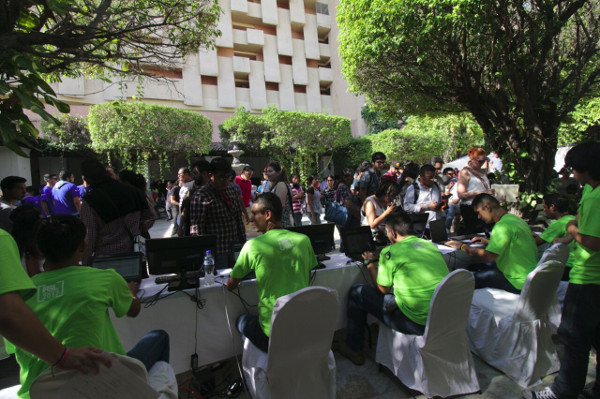
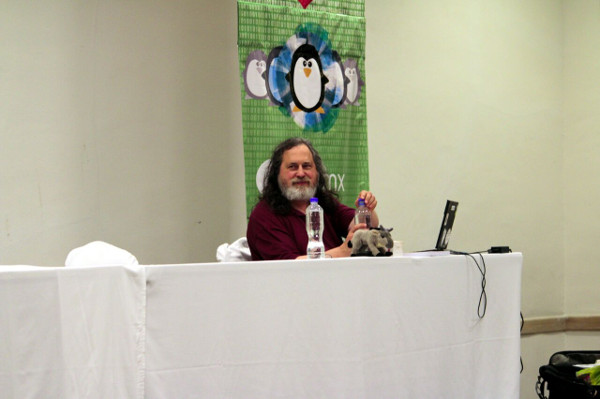
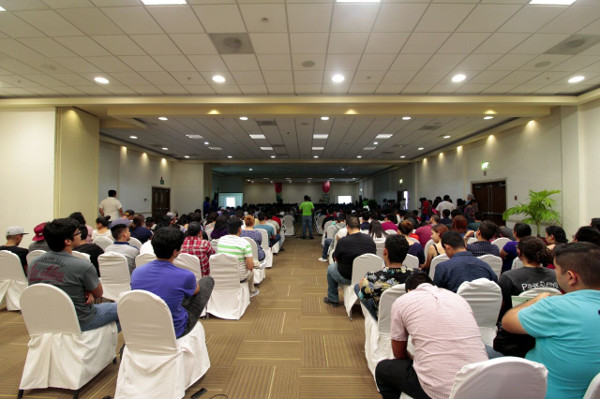
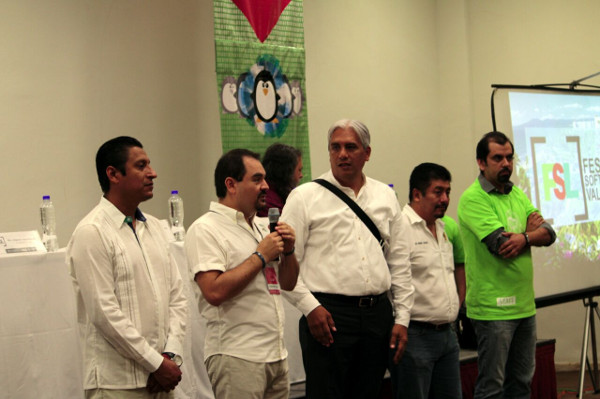
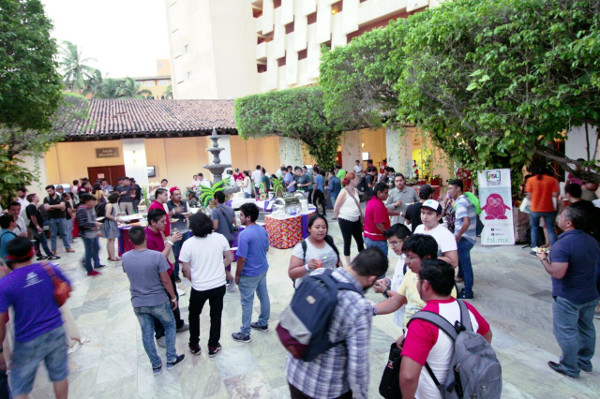
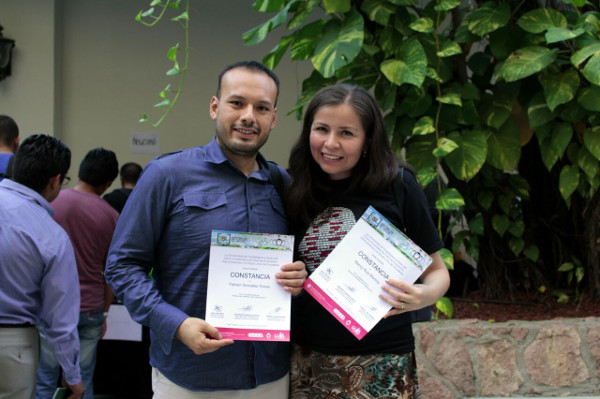
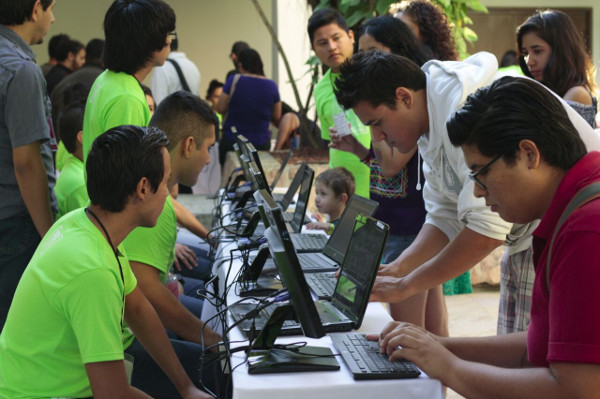
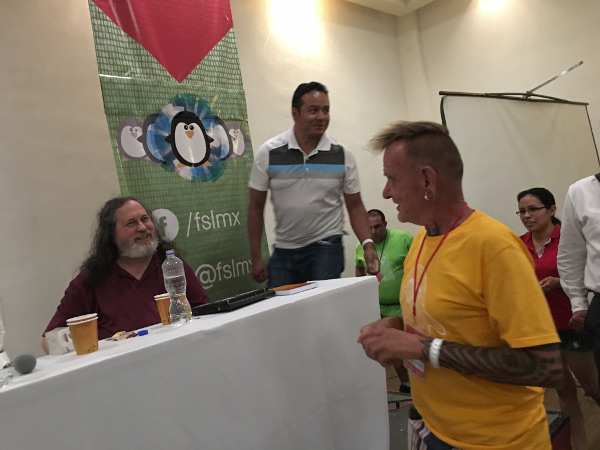
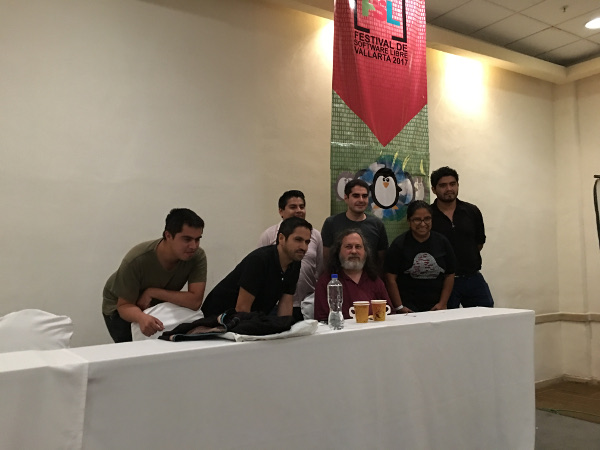
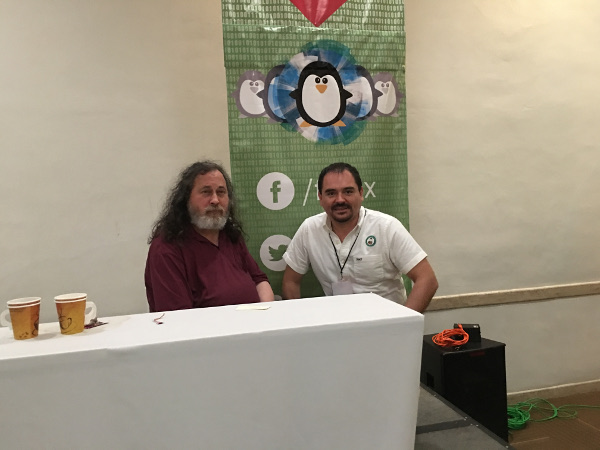
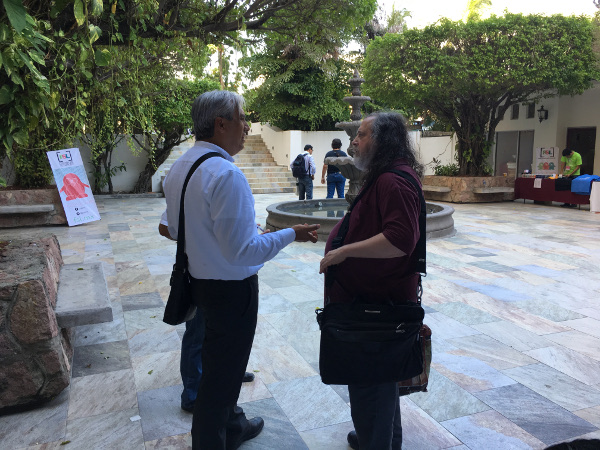
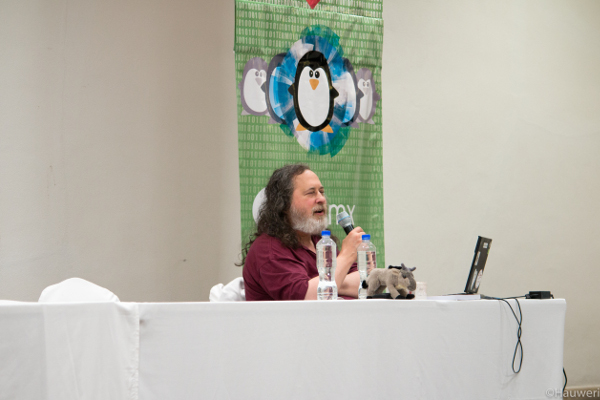
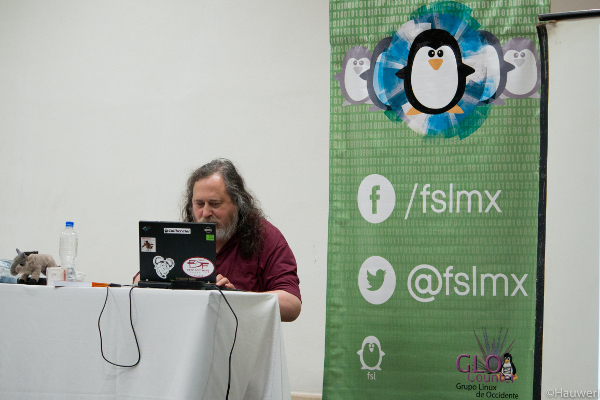
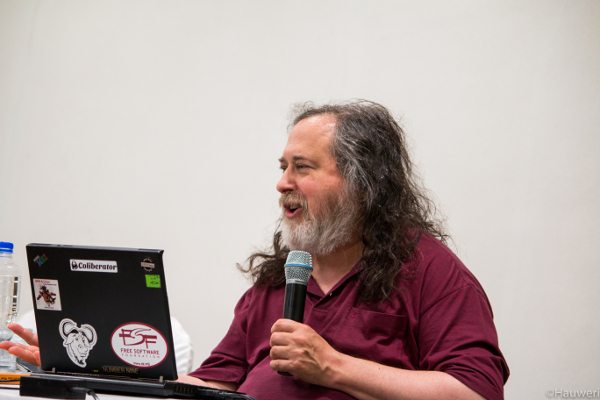
(Copyright © 2017 Festival de Software Libre. Photos licensed under CC BY 4.0.)
After a couple of days in Mexico City, he headed to Tlaxcala, where about 250 people came to hear him give his speech "Copyright vs. Community," at the Universidad Politécnica de Tlaxcala. The director of the IT department can be seen below presenting RMS with a gift, a wooden panel that Tlaxcala artisans had carved for him.
Osvaldo Moreno Hernández, a professor at the school, was very pleased he was able to organize the speech, "because of the students' great interest in learning about the philosophy behind free software, and, most of all, in learning about its impact on our lives." The school offers a degree in information technology, and free software is used in the education process, so he is "considering giving a boost to [using] free software throughout the entire school, and especially in the IT department."







(Copyright © 2017 Osvaldo Moreno Hernández. Photos licensed under CC BY 4.0.)
Back in Mexico City, RMS was at the Fábrica Digital del Centro Cultural y de Visitantes El Rule, a visitor and cultural center, to give his speech "Libre software; Libre hardware designs," on October 31st.





(Copyright © 2017 Free Software Foundation, Inc. Photos licensed under CC BY 4.0.)
His final stop in Mexico was on November 3rd, in Puebla, where he had spoken also in 2011, 2012, and 2013.
Thank you to everyone who made this trip possible!
Please fill out our contact form, so that we can inform you about future events in and around Mexico City, Gómez Palacio, Puerto Vallarta, Tlaxcala, and Puebla.
Please see www.fsf.org/events for a full list of all of RMS's confirmed engagements, and contact rms-assist@gnu.org if you'd like him to come speak.
The Licensing and Compliance Lab interviews BiglyBT
mercredi 29 novembre 2017 à 21:45 |
What is BiglyBT?
BiglyBT is a peer-to-peer torrent client, forked from the Azureus and Vuze code. We are two of the original authors of these clients, and after 14 years, our passion for developing for it has not run out. Our client has a long history of being known as powerful, feature-filled, and customizable, and we want to continue that trend with BiglyBT.
Can you tell us some about the roots of BiglyBT?
It all began with the free software project Azureus. Back in 2003, the first developer wanted to experiment with the Java UI toolkit SWT. Fueled by recent relationship changes, he started to develop Azureus. With very few torrent clients available, and a great list of features, Azureus’ popularity went through the roof. Wanting to turn the project into a full business, in 2005-6, the Azureus team took their idea to Silicon Valley, where it received funding, a new mission, and a new name -- Vuze. Vuze was aimed at providing content from big names, and focused on an easier video experience for users. After several years of courting the media companies, in 2010, Vuze was spun off to different management, under "Azureus Software, Inc."
Fast forward to 2017, the free software code developed over the course of Azureus' and Vuze’s lifetime was forked into a new project, BiglyBT.
Can you tell us some of the work that went into removing the proprietary code?
There were two main proprietary aspects of Vuze that we removed. Firstly, there was code to support the "Vuze Plus" premium product, which has purchasable features. The majority of this was contained in proprietary plugins, but there was also support code in the Vuze core to manage licensing, etc. Secondly, there was code to support proprietary services hosted on central servers, such as the content platform Web site. It was relatively easy to remove these components.
What features do you think really set BiglyBT apart from other torrent clients?
BiglyBT’s use of the DHT (a decentralized distributed system) is probably the biggest thing that sets us apart. Using the DHT, the Swarm Discoveries feature generates lists of content that are related to content the user has downloaded. BiglyBT will look for other torrents containing the same files you are trying to download, and with Swarm Merging, combines the two swarms for faster downloading and the ability to complete torrents without any seeds. The DHT is also used for torrent/tracker/tag-based chat channels. We are the only client that integrates directly into the I2P DHT, allowing us to have anonymous chats and better anonymous torrenting and peer finding.
Another major aspect is torrent control and organization. BiglyBT has the most configurable seeding rules in any client. Content can be categorized and tagged. Tags can be assigned manually or via restrictions and functional logic. Custom actions can be taken on a per-tag basis.
A much larger list of features that sets us apart can be found at https://www.biglybt.com/features.php.
Why did you choose the GNU GPLv3 as BiglyBT's license?
The source code that BiglyBT is based on, Azureus, started as GPLv2 (or later), so it’s only fitting (and legally required!) to keep BiglyBT as GPL.
The GPL affords us the ability to integrate Apache Licensed code into BiglyBT, using version 3 of the GPL license, and version 2 of APL. This is very important when developing for Android, since most of the 3rd party libraries are APL.
How can users (technical or otherwise) help contribute to BiglyBT?
Visit us on GitHub (https://github.com/BiglySoftware for both BiglyBT and migrated plugins) and get involved! We are currently using the "Issues" on GitHub to manage bug reports and feature requests.
Our international users could greatly help us out by completing our rather large translations. While we have over 40 language files in our project, most of them are incomplete, and only a couple of them have active contributors.
Non-technical users can help us by getting the word out about our client. Marketing is very difficult for small free software projects with only developers and no PR team.
Users who run trackers or other torrent listing sites can help contribute by listing our app on their site. In the past, we’ve worked anonymously with tracker admins to build features and solve tracker-related issues. BiglyBT also has meta-search ability, and the ability for users to add search templates for any tracker that provides them. It’s out of the scope of our team to create search templates for every tracker site, so we rely on tracker owners and users to create and distribute these.
What's the next big thing for BiglyBT?
We are already seeing a renewed interest in contributing to the project by the free software community -- initially we are looking to further cultivate this, as passionate contributors (such as ourselves) are key to evolving the project.
BiglyBT logo used with permission.
LibrePlanet Scholarship Fund: last chance to apply!
mercredi 29 novembre 2017 à 19:50If you're planning to attend LibrePlanet 2018 in the Boston area, March 24-25, 2018, and need financial assistance to help cover the cost of getting there, you must apply for a scholarship by Friday, December 1, at 10:00 EST (15:00 UTC), a small extension from the original deadline of Thursday 30th.
This will be the 10th anniversary of the LibrePlanet free software conference, and you don't want to miss it! Register today -- and remember, Free Software Foundation (FSF) Associate Members attend gratis!
Or, if you don't need travel funding, and you have a few dollars to spare, why not make a donation in support of the LibrePlanet Scholarship Fund? You'll be supporting a robust, diverse free software community by helping reduce the financial barrier to attendance for those who need the help.
Free Software Directory meeting recaps, November 2017
mercredi 29 novembre 2017 à 17:46Every week free software activists from around the world come together
in #fsf on irc.freenode.org to help improve the
Free Software Directory. We had an exciting month working the Directory with our wonderful
stable of volunteers. These folks show up week in and week out to
improve the Directory. It's also important to note the valiant efforts of
those volunteers who can't make an appearance at the meeting, proper
but still plug away at Directory entries during the week. With all these efforts, we are
looking towards 16,000 entries.
We split our time this month between new entries and two theme days. The November 10 meeting focused on evolution in a myriad of forms. We also had an interesting discussion about the terms of service of Ancestry.com's DNA analysis. We also talked some about how free software has evolved over the years.
The following week we delved into Human Interface Devices (HID). While adding entries, attendees discussed some of alternate forms of HIDs, and agreed on a favorite, the one-handed keyboard.
Finally, we closed out the month with a meeting focused on new entries -- this meeting was slower than most since it fell on an American holiday.
If you would like to help update the directory, meet with us every Friday in #fsf on irc.freenode.org from 12 p.m. to 3 p.m. EDT (16:00 to 19:00 UTC).
Give the gift of FSF membership and double your impact with a $10K match!
mardi 28 novembre 2017 à 17:55Give a current or potential free software supporter a Free Software Foundation (FSF) Associate Membership today, and your support of the FSF will be doubled!
Thanks to the generosity of the Frâncu family, the impact of all new memberships between now and December 9th will be matched, up to $10,000. Giving a membership now will count double, and you'll also help us reach our goal of 700 new members, powering up our work for 2018!
By donating an FSF membership, you'll be helping a nonprofit that's earned Charity Navigator's highest rating in fiscal responsibility and transparency, and you'll also be helping to defend and promote computer user rights -- human rights. You will get the warm fuzzy feeling that comes from knowing your gift will be working to build a stronger community, and your gift recipient will be able to enjoy a number of cool benefits: an ultra-slim USB membership card, the opportunity to take advantage of the FSF member email-forwarding service, free attendance at the annual LibrePlanet conference, a 20 percent discount on FSF merchandise, a 5 percent discount on ThinkPenguin hardware, a print copy of the FSF's biannual Bulletin, discounts on training classes and eligibility for LibreOffice certification, an fsf/member IRC cloak on Freenode, an FSF button for their Web site, use of an XMPP (Jabber) service, and Digital Credit Union eligibility.
Giving a membership as a gift is easy: make a donation of $60 for a student membership or $120 for an Associate Membership, or any larger amount you wish, then email us at membership@fsf.org with the gift membership recipient's:
- name,
- email address, and
- mailing address (provide this if you would like us to mail the membership welcome packet directly to them, including the membership gift).
From now until December 31st, 2017, for Associate Memberships of $120 or more, you can also select our newest Four Freedoms t-shirt for the recipient of the membership (be sure to let us know their size)!
We will then let them know that the gift is coming from you, inform them of the benefits that come with being a member, and create their membership account.
If you wish to give the recipient the welcome packet yourself, and save the surprise for later, please just let us know.
The FSF receives very little funding from corporations, so donations from individuals like you truly power our work. Your gift will help us start 2018 off with a bang! As of this writing, we need 618 more members to reach 700. Hope you can help us get there!
We will mail gift membership packets from Boston, Massachusetts, USA, on a rolling basis.